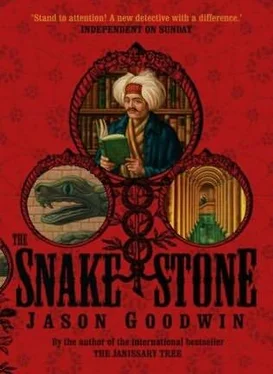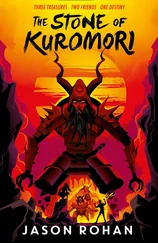Jason Goodwin - The snake stone
Здесь есть возможность читать онлайн «Jason Goodwin - The snake stone» весь текст электронной книги совершенно бесплатно (целиком полную версию без сокращений). В некоторых случаях можно слушать аудио, скачать через торрент в формате fb2 и присутствует краткое содержание. Жанр: Исторический детектив, на английском языке. Описание произведения, (предисловие) а так же отзывы посетителей доступны на портале библиотеки ЛибКат.
- Название:The snake stone
- Автор:
- Жанр:
- Год:неизвестен
- ISBN:нет данных
- Рейтинг книги:4 / 5. Голосов: 1
-
Избранное:Добавить в избранное
- Отзывы:
-
Ваша оценка:
- 80
- 1
- 2
- 3
- 4
- 5
The snake stone: краткое содержание, описание и аннотация
Предлагаем к чтению аннотацию, описание, краткое содержание или предисловие (зависит от того, что написал сам автор книги «The snake stone»). Если вы не нашли необходимую информацию о книге — напишите в комментариях, мы постараемся отыскать её.
The snake stone — читать онлайн бесплатно полную книгу (весь текст) целиком
Ниже представлен текст книги, разбитый по страницам. Система сохранения места последней прочитанной страницы, позволяет с удобством читать онлайн бесплатно книгу «The snake stone», без необходимости каждый раз заново искать на чём Вы остановились. Поставьте закладку, и сможете в любой момент перейти на страницу, на которой закончили чтение.
Интервал:
Закладка:
Eslek cut the air with his hand. “Too true, George. And I get the word that you was fitted up,” he added. “Valuable pitch, right? They made an offer.”
George rubbed his chest. “Those bastards,” he said quietly. “I works that market before they is born.”
“It was your father’s pitch,” Eslek pointed out.
“My grandfather had the farm,” George said. “Old Constantinedes lived nearby. He drink too much, beat his wife. So-my father helps his boys, brings them to the market. But they is bad boys who cheats peoples. My father says-we finds you new pitch. You cheats too many peoples, the peoples don’t come.”
George wiped his eyes with his massive thumb, and spat.
“When my father dies they says: George, it is finish for you now at market. Stay on farm, sell us your vegetables, and we sell to the peoples. But I think, no. These boys cheats the peoples. If I stops the market, why you not think they try to cheat me, too? Of course!”
“No one else asked you for money, then?”
“Money?” George looked surprised. “You asks rich man for money. Not the vegetable man.”
“And the men who attacked you. Did you recognize them?”
“No, efendi. I never sees them before in my whole life.”
Yashim and Eslek exchanged glances. “Leave it to me,” Eslek said. “And don’t worry. When you feel all right you can go back to your pitch. The Constantinedes brothers won’t be bothering you again.”
94
Yashim paid a hurried visit to the hammam before crossing the Horn by caique. It was still light when he arrived at the Polish residency. Palewski greeted him at the door.
“Come upstairs,” he said. “I thought of opening up the dining room, in your honor-but I’m afraid it’s a bit too far gone. The sitting room will be cozier.”
Yashim tried to imagine Palewski’s dining room. Holes in the plaster? Cobwebs? The windows obscured by creepers, perhaps, growing unchecked for years.
One of the little jobs that Xani had been going to undertake, no doubt.
He stopped on the stairs, one hand on the rail. “I think I’ve got Xani wrong,” he said.
Palewski turned.
“Wrong?”
Yashim nodded. “Just like the Hetira. I thought it was a protection racket, something like that. I thought it could have people murdered.”
They began to climb the stairs again.
“Why not? Look what happened to George. Look at the way they jumped you on the caique that night.”
“George wasn’t done over by the Hetira. It was a turf war between him and another stallholder. Very vicious, and very unexpected. But not the Hetira. I learned that this afternoon.”
“But the caique? And your apartment-remember that?”
“What do those events really amount to? Threats, yes. Unpleasant, certainly. But I’m still alive. So, for that matter, are you.”
Palewski pushed the door and they went into his sitting room. “The Hetira came after you for the book, but they didn’t kill Lefevre. Is that what you’re saying?”
Yashim looked around. There was a small folding table set up in front of the empty grate. “They came after me-but I’m alive. Lefevre was disemboweled. Just like Goulandris and the Jew.”
Palewski’s hands were on a yellow bottle.
“Tokay, Yashim. Wonderfully cold.”
He took a heavy crystal wineglass from the table and filled it. Yashim noticed the table was laid for three.
“Who else are you expecting?”
“An old friend of yours, Yash. Third permanent undersecretary to the secretary to the ambassador at the British embassy-something like that.”
“The British embassy?” Yashim frowned. “I don’t have any old friends there. The only person I know is that ridiculous boy, Compston.”
Palewski grinned. “George Compston. Highly ridiculous, as you say. But he happens to be a Byron fanatic. And if I’m not mistaken, that’s him arriving now.”
A few moments later they heard a heavy tread on the stairs, and Marta ushered in a stout young man with a shock of yellow hair and an open, cheery red face.
Compston’s infatuation with the life and legend of Lord Byron had begun on the ship that carried him to his first diplomatic posting in Istanbul. It was a six-week voyage, and Compston had kept close to his berth throughout. By the time the ship reeled into the Sea of Marmara he had not only read the epic poem The Giaour, but was able to pronounce its title, too; an indulgent relative had kept him supplied with Don Juan and Childe Harold’s Pilgrimage, and his adulation had advanced and ripened over the past two years. Nowadays he wore a cummerbund without reflection, and a pencil mustache, and tilted at the knee when talking to European ladies, to “make a leg.”
It was his friend and mentor at the embassy, Ben Fizerly, who first noticed his limp and later remarked, a little crushingly, that it seemed to travel uneasily from foot to foot; but few people meeting Compston for the first time, cummerbund or no cummerbund, would have readily associated the boy with the open red face and big soft hands with the saturnine poet whose untimely death all Europe had mourned.
Compston did not mind. He had reached that stage in a young man’s passion for an idea when all that he looked on conformed to it and confirmed it in his mind. A set of chestnut ringlets recalled Byronic locks; a sigh, Byronic looks; a friendly wave, a Byronic gesture. His letters home to his sister had become so full of Byronic paradox and risque skits that she could hardly understand them anymore; and his speech was truffled with quotations from Childe Harold. Even Fizerly had declared that Compston was becoming quite a bore.
Over dinner-boiled beef, with a sorrel sauce-Yashim more than once found himself unwittingly echoing Fizerly’s opinion. It was not until Marta had cleared away the plates and set a decanter of port on the table that Palewski coughed and brought the Englishman to the theme in hand.
Compston put his fingers to his chin and talked in profile.
“Missilonghi, Excellency? The pride-and the shame of Greece.” He sighed. “The sultan had brought the armies of Egypt into Greece, as you’ll remember. They linked up with the Albanians, and Ibrahim Pasha drove the Greeks back into this forlorn spot, nothing but a marsh, really, running along the shore, and there, for a year, the banner of freedom fluttered above the wretched town, shattered by the Egyptian artillery, and cut off from all hope of aid.”
He poured himself a glass of port.
“I often try to imagine it. There’s a bit of coast where I’m from, Burnham Overy, with simply miles of dunes. Just imagine Burnham Overy with palm trees, and that’s Missilonghi. Hotter than Burnham Overy, of course. Otherwise the palm trees wouldn’t grow!”
“Quite so,” Palewski murmured.
“Of course we don’t get any Greeks in Norfolk, either. One or two in Norwich. I think you get a few Jews. A parcel of Greek fugitives-they’d cause quite a stir! Without doubt.”
He downed his glass and stared hard at the decanter.
Yashim coughed gently. “But Missilonghi, Mr. Compston.”
“Yes, of course. Missilonghi-there were thousands of Greek rebels there, men with their women and their children. Bit of a town. Too many tents. All protected by an earth bank. And every day they died, like Lord Byron himself. Cholera, hunger, Egyptian gunnery.” He squinted at his glass. “Not much like Burnham Overy at all, really,” he added.
“They couldn’t break out?”
“It’s like this, monsieur. In the first place, Ibrahim had them surrounded. In the second-well, the Greeks were divided among themselves, in spite of Lord Byron’s noble efforts to bring about a reconciliation. I happen to believe that’s what killed him-he was too generous with his energy and time, not to mention his money. Bringing the Suliotes up to scratch as soldiers. Trying to appease the rivalries between the factions.” Compston rubbed his eye with a finger. “The patience of that man! He knew what fools the Greeks were, but he never complained. Not to their very faces, at least. He died of a noble heart.”
Читать дальшеИнтервал:
Закладка:
Похожие книги на «The snake stone»
Представляем Вашему вниманию похожие книги на «The snake stone» списком для выбора. Мы отобрали схожую по названию и смыслу литературу в надежде предоставить читателям больше вариантов отыскать новые, интересные, ещё непрочитанные произведения.
Обсуждение, отзывы о книге «The snake stone» и просто собственные мнения читателей. Оставьте ваши комментарии, напишите, что Вы думаете о произведении, его смысле или главных героях. Укажите что конкретно понравилось, а что нет, и почему Вы так считаете.












